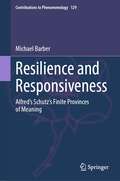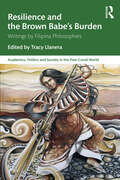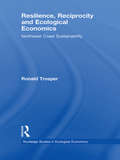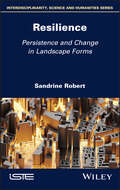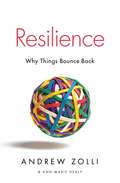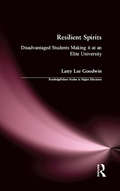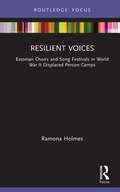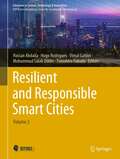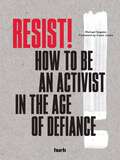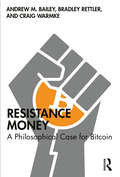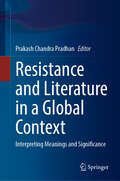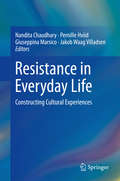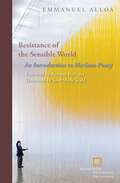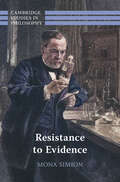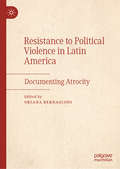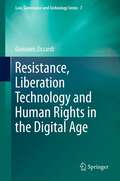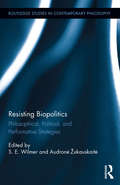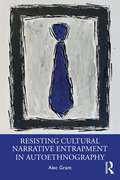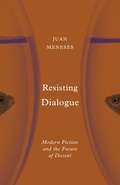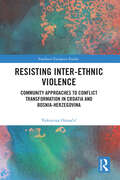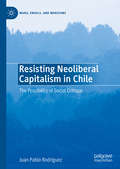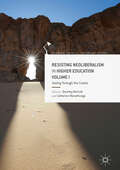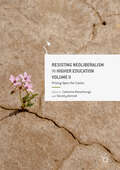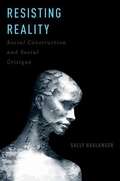- Table View
- List View
Resilience and Responsiveness: Alfred’s Schutz’s Finite Provinces of Meaning (Contributions to Phenomenology #129)
by Michael BarberThis book extends Alfred Schutz’s “On Multiple Realities” by describing the provinces of meaning of play, music, religious ritual, and African-American folkloric humor. Throughout these provinces, the author traces two themes: resilience and responsiveness. In resilience, individuals or communities run up against obstacles, imposed relevances, which they come to terms with, or give meaning to (in phenomenological parlance), by modifying, evading, overcoming, or accepting them. Responsiveness emerges from Schutz’s idea of making music together, which the author takes further by analyzing the mimetic encounter with the other and the asymmetries in listening to music, and, especially, by showing how the features of the cognitive style of music as a province of meaning affect sociality, disposing us to be more vulnerable and attentive to each other’s non-conceptual, musical meanings. This text appeals to upper-level undergraduate students and graduate students as well as to faculty in philosophy.
Resilience and the Brown Babe’s Burden: Writings by Filipina Philosophers (Academics, Politics and Society in the Post-Covid World)
by Tracy LlaneraThis volume examines the concept and practice of resilience from the perspective of Filipina philosophers. It investigates the double-edged nature of resilience and other key assumptions and ideas about human resilience and resilient cultures and institutions. The chapters in the collection are intersectional in approach, drawing from feminist theory, social and political philosophy, critical theory, pragmatism, virtue theory, social epistemology, and decolonial theory in their engagement of the theme. Part of the Academics, Politics and Society in the Post-Covid World series, the book will be of interest to scholars and students of philosophy, political theory, feminist theory, philosophy of education, cultural studies, and development studies. It will be valuable to academics in Philippine Studies, Asian and Southeast Asian Studies, and Global South Studies.
Resilience, Reciprocity and Ecological Economics: Northwest Coast Sustainability (Routledge Studies in Ecological Economics)
by Ronald TrosperHow did one group of indigenous societies, on the Northwest Coast of North America, manage to live sustainably with their ecosystems for over two thousand years? Can the answer to this question inform the current debate about sustainability in today’s social ecological systems? The answer to the first question involves identification of the key institutions that characterized those societies. It also involves explaining why these institutions, through their interactions with each other and with the non-human components, provided both sustainability and its necessary corollary, resilience. Answering the second question involves investigating ways in which key features of today’s social ecological systems can be changed to move toward sustainability, using some of the rules that proved successful on the Northwest Coast of North America. Ronald L. Trosper shows how human systems connect environmental ethics and sustainable ecological practices through institutions.
Resilience: Persistence and Change in Landscape Forms
by Sandrine RobertThe articulation between persistence and change is relevant to a great number of different disciplines. It is particularly central to the study of urban and rural forms in many different fields of research, in geography, archaeology, architecture and history. Resilience puts forward the idea that we can no longer be truly satisfied with the common approaches used to study the dynamics of landscapes, such as the palimpsest approach, the regressive method and the semiological analysis amongst others, because they are based on the separation between the past and the present, which itself stems from the differentiation between nature and society. This book combines spatio-temporalities, as described in archeogeography, with concepts that have been developed in the field of ecological resilience, such as panarchy and the adaptive cycle. Thus revived, the morphological analysis in this work considers landscapes as complex resilient adaptive systems. The permanence observed in landscapes is no longer presented as the endurance of inherited forms, but as the result of a dynamic that is fed by this constant dialogue between persistence and change. Thus, resilience is here decisively on the side of dynamics rather than that of resistance.
Resilience: Why Things Bounce Back
by Ann Marie Healy Andrew ZolliDiscover a powerful new lens for viewing the world with fascinating implications for our companies, economies, societies, and planet as a whole.What causes one system to break down and another to rebound? Are we merely subject to the whim of forces beyond our control? Or, in the face of constant disruption, can we build better shock absorbers—for ourselves, our communities, our economies, and for the planet as a whole? Reporting firsthand from the coral reefs of Palau to the back streets of Palestine, Andrew Zolli and Ann Marie Healy relate breakthrough scientific discoveries, pioneering social and ecological innovations, and important new approaches to constructing a more resilient world. Zolli and Healy show how this new concept of resilience is a powerful lens through which we can assess major issues afresh: from business planning to social development, from urban planning to national energy security—circumstances that affect us all. Provocative, optimistic, and eye-opening, Resilience sheds light on why some systems, people, and communities fall apart in the face of disruption and, ultimately, how they can learn to bounce back.
Resilient Spirits: Disadvantaged Students Making it at an Elite University (RoutledgeFalmer Studies in Higher Education)
by Latty Lee GoodwinThis study explores the identity construction of socioeconomically and educationally disadvantaged students who enter an elite university. This critical ethnography gathered qualitative data about the twenty-three participants through non-participant observation, in-depth interviews, and focus groups. Faculty, staff, and administrators were also interviewed.
Resilient Voices: Estonian Choirs and Song Festivals in World War II Displaced Person Camps
by Ramona HolmesThe aftermath of World War II sent thousands of Estonian refugees into Europe. The years of Estonian independence (1917-1940) had given them a taste of freedom and so relocation to displaced person (DP) camps in post-war Germany was extremely painful. One way in which Estonians dealt with the chaos and trauma of WWII and its aftermath was through choral singing. Just as song festivals helped establish national identity in 1869, song festivals promoted cultural cohesiveness for Estonians in WWII displaced person camps. A key turning point in hope for the Estonian DPs was the 1947 Augsburg Song Festival, which is the center point of this book. As Estonian DPs dispersed to Australia, Canada, Europe, and the United States these choirs and song festivals gave Estonians the resilience to retain their identity and to thrive in their new homes. This history of Estonian WWII DP camp choirs and song festivals is gathered from the stories of many courageous individuals and filled with the tenacious spirit of the Estonian singing culture. This work contributes to an understanding of immigration, identity, and resilience and is particularly important within the field of music regarding music and healing, music and identity, historical musicology, ethnomusicology, and music and politics.
Resilient and Responsible Smart Cities: Volume 2 (Advances in Science, Technology & Innovation)
by Hugo Rodrigues Hassan Abdalla Tomohiro Fukuda Vimal Gahlot Mohammad Salah UddinThis book aims to establish a community with attention to land use to achieve sustainable development and meet the needs of today’s society. Urban planning depends on engineering, architectural, social and political pillars. It pursues this by proposing solutions, regulating environmental pollution and non-sustainable use of available resources. It showcases and even triggers further debate about connections between sustainable development, urban planning and technology in hopes of achieving sustainable development models that sustain urban expansion and shape cities that improve the overall quality of life. It views urban planning and development as vital fields that ensure the application of revolutionary approaches with new materials and processes incorporated in the most efficient manner.
Resist!: How to Be an Activist in the Age of Defiance
by HuckResist! is the indispensable how-to guide for people looking to make a stand. Included are solid pieces of advice, practical tips and inspirational stories from those who have already successfully stood up and made a difference. Learn the principles of direct action, discover strategies for tackling social media, unearth ideas for motivating others, and understand how to get access to the people in power and get your message across.With a foreword by columnist, campaigner and best-selling author Owen Jones which unravels the political world and underlines why now is the time to act.
Resistance Money: A Philosophical Case for Bitcoin
by Andrew M. Bailey Bradley Rettler Craig WarmkeBitcoin isn’t just for criminals, speculators, or wealthy Silicon Valley entrepreneurs – despite what the headlines say. In an imperfect world of rampant inflation, creeping authoritarianism, surveillance, censorship, and financial exclusion, bitcoin empowers individuals to elude the expanding reach and tightening grip of institutions both public and private. So although bitcoin is money, it isn’t just money. Bitcoin is resistance money.Resistance Money: A Philosophical Case for Bitcoin begins by explaining why bitcoin was invented, how it works, and where it fits among other kinds of money. The authors then offer a framework for evaluating bitcoin from a global perspective and use it to examine bitcoin’s monetary policy, censorship-resistance, privacy, inclusion, and energy use. The book develops a comprehensive and measured case that bitcoin is a net benefit to the world, despite its imperfections. Resistance Money is intended for all, from the clueless to the specialist, from the proponent to the die-hard skeptic, and everyone in between.Key Features: Provides a philosophical approach that makes use of multiple disciplines in its analysis Offers a clearly written, measured academic treatment of bitcoin, comprehensive in scope and free of ideological baggage Includes information on the financial, social, and environmental costs of bitcoin, how these costs are sometimes exaggerated, and how they might be mitigated Addresses the strongest arguments against bitcoin and shows how some succeed and most come up short.
Resistance and Literature in a Global Context: Interpreting Meanings and Significance
by Prakash Chandra PradhanThe comprehensive volume delves into the discursive valences and contingencies of resistance. It examines key issues and situations within the complex power dynamics of various cultures, societies, nations, and ethnicities. It explores the varying meanings of resistance in different contexts with analyses of select literary texts from various works of literature worldwide that range from Tribal writings in English and Nepalese literature to British literature and American literature. It evaluates various factors, including structure, situation, context, culture, agency, place, motives, ideology and oppression within the discourse of resistance. It emphasizes the cultural relevance of the study of resistance across a range of fields, such as postcolonialism, feminism, ecocriticism, gender relations and sexuality, myth and folklore, existentialism, cultural studies, rural feminism, trauma theory and violence, globalization, ethnicity and identity, child trafficking and third gender issues, subalternity and marginality. The book covers the genres of novels, poetry, autobiography, and short stories. It investigates the potency of these literary forms as cultural expressions of resistance. It is an essential read for students, researchers, and teachers worldwide who are enthusiastic and curious about the meanings and contexts of resistance and its representations in literature.
Resistance in Everyday Life
by Nandita Chaudhary Giuseppina Marsico Pernille Hviid Jakob Waag VilladsenThis book is about resistance in everyday life, illustrated through empirical contexts from different parts of the world. Resistance is a widespread phenomenon in biological, social and psychological domains of human cultural development. Yet, it is not well articulated in the academic literature and, when it is, resistance is most often considered counter-productive. Simple evaluations of resistance as positive or negative are avoided in this volume; instead it is conceptualised as a vital process for human development and well-being. While resistance is usually treated as an extraordinary occurrence, the focus here is on everyday resistance as an intentional process where new meaning constructions emerge in thinking, feeling, acting or simply living with others. Resistance is thus conceived as a meaning-making activity that operates at the intersection of personal and collective systems. The contributors deal with strategies for handling dissent by individuals or groups, specifically dissent through resistance. Resistance can be a location of intense personal, interpersonal and cultural negotiation, and that is the primary reason for interest in this phenomenon. Ordinary life events contain innumerable instances of agency and resistance. This volume discusses their manifestations, and it is therefore of interest for academics and researchers of cultural psychology, cultural studies, anthropology, sociology, and human development.
Resistance of the Sensible World: An Introduction to Merleau-Ponty (Perspectives in Continental Philosophy)
by Emmanuel AlloaIn this book, Emmanuel Alloa offers a handrail for venturing into the complexities of the work of the French philosopher Maurice Merleau-Ponty (1908–61). Through a comprehensive analysis of the three main phases of Merleau-Ponty’s thinking and a thorough knowledge of his many unpublished manuscripts, the author traces how Merleau-Ponty’s philosophy evolved and exposes the remarkable coherence that structures it from within. Alloa teases out the continuity of a motive that traverses the entire oeuvre as a common thread. Merleau-Ponty struggled incessantly against any kind of ideology of transparency, whether of the world, of the self, of knowledge, or of the self’s relation to others.Already translated into several languages, Alloa’s innovative reading of this crucially important thinker shows why the issues Merleau-Ponty raised are, more than ever, those of our time.
Resistance to Evidence (Cambridge Studies in Philosophy)
by Mona SimionWe have increasingly sophisticated ways of acquiring and communicating knowledge, but efforts to spread this knowledge often encounter resistance to evidence. The phenomenon of resistance to evidence, while subject to thorough investigation in social psychology, is acutely under-theorised in the philosophical literature. Mona Simion's book is concerned with positive epistemology: it argues that we have epistemic obligations to update and form beliefs on available and undefeated evidence. In turn, our resistance to easily available evidence is unpacked as an instance of epistemic malfunctioning. Simion develops a full positive, integrated epistemological picture in conjunction with novel accounts of evidence, defeat, norms of inquiry, permissible suspension, and disinformation. Her book is relevant for anyone with an interest in the nature of evidence and justified belief and in the best ways to avoid the high-stakes practical consequences of evidence resistance in policy and practice. This title is also available as Open Access on Cambridge Core.
Resistance to Political Violence in Latin America: Documenting Atrocity
by Oriana BernasconiThis book analyzes state terror documentation as a form of peaceful resistance to oppressive regimes through substantial research in human rights archives that registered violations perpetrated by Augusto Pinochet’s dictatorship in Chile. The contributors provide in-depth analysis on state violence documentation, denunciation and resistance and how it affected civilians, activists and victims. Additionally, the project introduces research in transitional contexts (post-dictatorship, post-apartheid and post-colonialism) showing the role of documentation practices in achieving truth, reparation and justice. This work will be relevant to academics, students and researchers in the fields of political science, political history, Latin American and memory studies.
Resistance, Liberation Technology and Human Rights in the Digital Age
by Giovanni ZiccardiThis book explains strategies, techniques, legal issues and the relationships between digital resistance activities, information warfare actions, liberation technology and human rights. It studies the concept of authority in the digital era and focuses in particular on the actions of so-called digital dissidents. Moving from the difference between hacking and computer crimes, the book explains concepts of hacktivism, the information war between states, a new form of politics (such as open data movements, radical transparency, crowd sourcing and "Twitter Revolutions"), and the hacking of political systems and of state technologies. The book focuses on the protection of human rights in countries with oppressive regimes.
Resistance, Rebellion, and Death
by Albert Camus Justin O'BrienResistance, Rebellion, and Death displays Camus's rigorous moral intelligence addressing issues that range from colonial warfare in Algeria to the social cancer of capital punishment. But this stirring book is above all a reflection on the problem of freedom, and, as such, belongs in the same tradition as the works that gave Camus his reputation as the conscience of the 20th century: The Stranger, The Rebel, and The Myth of Sisyphus.
Resisting Biopolitics: Philosophical, Political, and Performative Strategies (Routledge Studies in Contemporary Philosophy)
by S. E. Wilmer Audronė ŽukauskaitėThe topic of biopolitics is a timely one, and it has become increasingly important for scholars to reconsider how life is objectified, mobilized, and otherwise bound up in politics. This cutting-edge volume discusses the philosophical, social, and political notions of biopolitics, as well as the ways in which biopower affects all aspects of our lives, including the relationships between the human and nonhuman, the concept of political subjectivity, and the connection between art, science, philosophy, and politics. In addition to tracing the evolving philosophical discourse around biopolitics, this collection researches and explores certain modes of resistance against biopolitical control. Written by leading experts in the field, the book’s chapters investigate resistance across a wide range of areas: politics and biophilosophy, technology and vitalism, creativity and bioethics, and performance. Resisting Biopolitics is an important intervention in contemporary biopolitical theory, looking towards the future of this interdisciplinary field.
Resisting Cultural Narrative Entrapment in Autoethnography
by Alec GrantResisting Cultural Narrative Entrapment in Autoethnography delves into the nexus of cultural narratives and takes the reader on a journey through the intricate landscape of identity and cultural critique. Each chapter, enriched with dialogues with 'Ash,' our imaginary interlocutor, presents a profound exploration rooted in the philosophical fabric.This book amplifies the discourse on ontological and epistemological reflections often overlooked in narrative autoethnography. Central to its narrative is the concept of cultural narrative entrapment, meticulously dissected to unveil its philosophical underpinnings. It focuses on probing inquiries, from the essence of resistance to cultural narrative entrapment to its pivotal role in shaping autoethnographic scholarship. Through meticulous textual 'archaeology' chapters unfold, excavating layers of literature to redefine cultural identity and narrative constructs, offering a meta-autoethnographic lens. The discourse evolves, addressing critiques and paradoxes, while inviting readers to engage with the complexities of perception, representation, and the paradoxes of emplotment. Culminating with an illuminating appendix summarising the author's extensive body of work, this book serves as a beacon for scholars and practitioners navigating the nuanced terrain of philosophical autoethnography.This book transcends the boundaries of traditional scholarship, offering a compelling narrative that challenges conventions and ignites intellectual curiosity. It is an indispensable companion for those seeking to unravel the profound intersections of culture, identity, and philosophical inquiry.
Resisting Dialogue: Modern Fiction and the Future of Dissent
by Juan MenesesA bold new critique of dialogue as a method of eliminating dissent Is dialogue always the productive political and communicative tool it is widely conceived to be? Resisting Dialogue reassesses our assumptions about dialogue and, in so doing, about what a politically healthy society should look like. Juan Meneses argues that, far from an unalloyed good, dialogue often serves as a subtle tool of domination, perpetuating the underlying inequalities it is intended to address.Meneses investigates how &“illusory dialogue&” (a particular dialogic encounter designed to secure consensus) is employed as an instrument that forestalls—instead of fostering—articulations of dissent that lead to political change. He does so through close readings of novels from the English-speaking world written in the past hundred years—from E. M. Forster&’s A Passage to India and Jeanette Winterson&’s The Passion to Indra Sinha&’s Animal&’s People and more. Resisting Dialogue demonstrates how these novels are rhetorical exercises with real political clout capable of restoring the radical potential of dialogue in today&’s globalized world. Expanding the boundaries of postpolitical theory, Meneses reveals how these works offer ways to practice disagreement against this regulatory use of dialogue and expose the pitfalls of certain other dialogic interventions in relation to some of the most prominent questions of modern history: cosmopolitanism at the end of empire, the dangers of rewriting the historical record, the affective dimension of neoliberalism, the racial and nationalist underpinnings of the &“war on terror,&” and the visibility of environmental violence in the Anthropocene. Ultimately, Resisting Dialogue is a complex, provocative critique that, melding political and literary theory, reveals how fiction can help confront the deployment of dialogue to preempt the emergence of dissent and, thus, revitalize the practice of emancipatory politics.
Resisting Inter-Ethnic Violence: Community Approaches to Conflict Transformation in Croatia and Bosnia-Herzegovina (Southeast European Studies)
by Valentina OtmačićThis book analyses the 1991 to 1995 war experiences of ethnically mixed communities who successfully resisted identity-based violence and segregation in Croatia and Bosnia-Herzegovina. Challenging the prevailing view of the wars in these countries as ethnic struggles rooted in historical antagonisms, it adds complexity to our understanding of peace and violence by contributing previously untapped insights into local dynamics of inter-ethnic collaboration. Exploring the strategies and approaches applied to resist violence and to transform conflict in a constructive manner, it provides an important comparative analysis of the experiences and proposes a framework for community resistance to identity-based violence in multi-ethnic societies.This volume will contribute to the ongoing debates of scholars and practitioners on the causes and consequences of violent conflicts, and the related practical approaches to violence prevention and peacebuilding. Highly relevant to scholars and students in peace and conflict studies, political science, international relations, security studies, history, sociology, and social psychology, it willalso be of great interest to policy makers and practitioners in conflict management, conflict transformation and local governance.
Resisting Neoliberal Capitalism in Chile: The Possibility of Social Critique (Marx, Engels, and Marxisms)
by Juan Pablo RodríguezThis book explores the relationship between recent theoretical debates around the fate of critique of neoliberal capitalism and critical theory, on the one hand, and the critical theories generated in and by social movements in Chile, on the other. By taking the idea of social critique as a field that encompasses both critical social theories and the practices of social criticism carried out by social movements, Resisting Neoliberal Capitalism in Chile explores how the student and the Pobladores movements map, resist and contest neoliberal capitalism in commodified areas such as education and housing in Chile, one of the first ‘neoliberal experiments’ in Latin America and the world.
Resisting Neoliberalism in Higher Education Volume I: Seeing Through the Cracks (Palgrave Critical University Studies)
by Dorothy Bottrell Catherine ManathungaIn light of the overwhelming presence of neoliberalism within academia, this book examines how academics resist and manage these changes. The first of two volumes, this diptych of critical academic work investigates generative spaces, or ‘cracks’ in neoliberal managerialism that can be exposed, negotiated, exploited and energised with renewed collegiality, subversion and creativity. The editors and contributors explore how academics continue to find space to work in collegial ways; defying the neoliberal logic of ‘brands’ and ‘cost centres’. Part I of this diptych illuminates the lived experiences of changing academic roles; portraying institutional life without the glossy filter of marketing campaigns and brochures, and revealing generative spaces through critical testimony, fiction, arts-based projects, feminist and Indigenous critical scholarship. It will be of interest and value to anyone concerned with neoliberalism in academia, as well as higher education more generally.
Resisting Neoliberalism in Higher Education Volume II: Prising Open The Cracks (Palgrave Critical University Studies)
by Dorothy Bottrell Catherine ManathungaThis book outlines the creative responses academics are using to subvert powerful market forces that restrict university work to a neoliberal, economic focus. The second volume in a diptych of critical academic work on the changing landscape of neoliberal universities, the editors and contributors examine how academics ‘prise open the cracks’ in neoliberal logic to find space for resistance, collegiality, democracy and hope. Adopting a distinctly postcolonial positioning, the volume interrogates the link between neoliberalism and the ongoing privileging of Euro-American theorising in universities. The contributors move from accounts of unmitigated managerialism and toxic workplaces, to the need to decolonise the academy to, finally, illustrating the various creative and counter-hegemonic practices academics use to resist, subvert and reinscribe dominant neoliberal discourses. This hopeful volume will appeal to students and scholars interested in the role of universities in advancing cultural democracy, as well as university staff, academics and students.
Resisting Reality: Social Construction and Social Critique
by Sally HaslangerContemporary theorists use the term "social construction" with the aim of exposing how what's purportedly "natural" is often at least partly social and, more specifically, how this masking of the social is politically significant. In these previously published essays, Sally Haslanger draws on insights from feminist and critical race theory to explore and develop the idea that gender and race are positions within a structure of social relations. On this interpretation, the point of saying that gender and race are socially constructed is not to make a causal claim about the origins of our concepts of gender and race, or to take a stand in the nature/nurture debate, but to locate these categories within a realist social ontology. This is politically important, for by theorizing how gender and race fit within different structures of social relations we are better able to identify and combat forms of systematic injustice. Although the central essays of the book focus on a critical social realism about gender and race, these accounts function as case studies for a broader critical social realism. To develop this broader approach, several essays offer reworked notions of ideology, practice, and social structure, drawing on recent research in sociology and social psychology. Ideology, on the proposed view, is a relatively stable set of shared dispositions to respond to the world, often in ways that also shape the world to evoke those very dispositions. This looping of our dispositions through the material world enables the social to appear natural. Additional essays in the book situate this approach to social phenomena in relation to philosophical methodology, and to specific debates in metaphysics, epistemology, and philosophy of language. The book as a whole explores the interface between analytic philosophy and critical theory.
